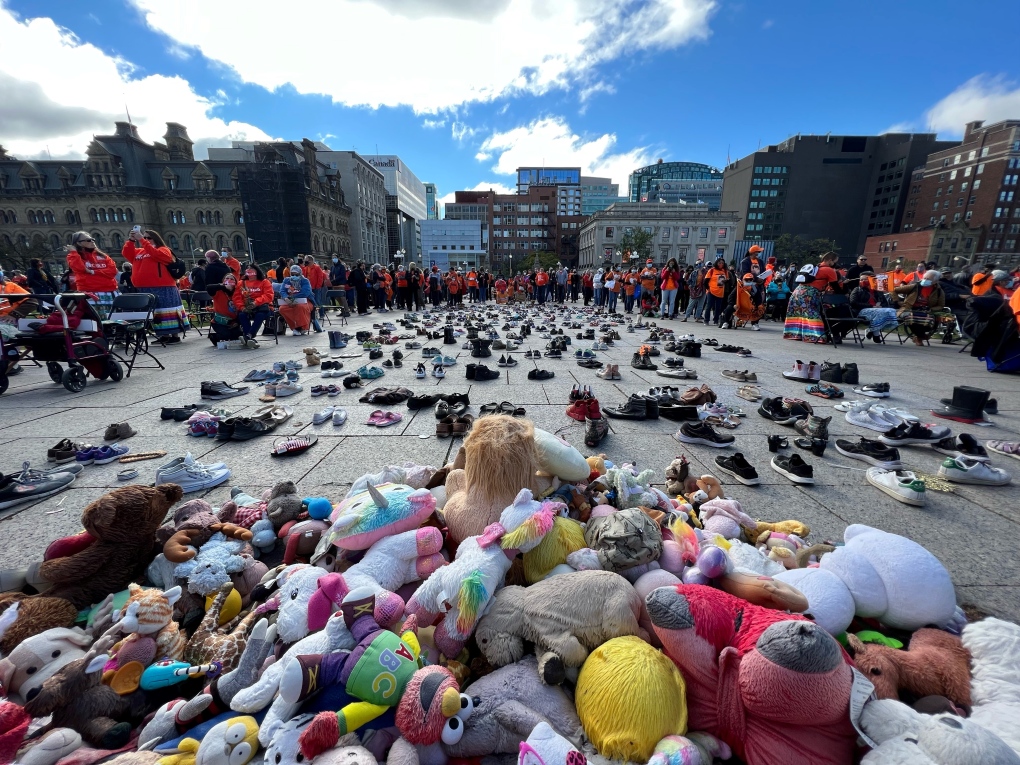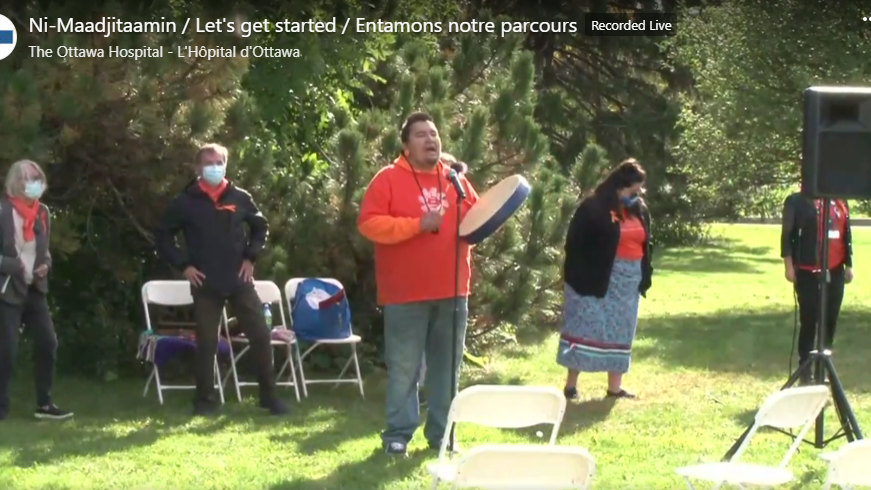Ottawa marks the first National Day for Truth and Reconciliation
Ceremonies were held across Ottawa to mark the first National Day for Truth and Reconciliation in Canada.
"Today we gather to honour all those children who did not make it home," said Algonquin Elder Claudette Commanda during a rally on Parliament Hill. "Two-hundred and fifteen little voices woke the country, 215 voices spoke to the world."
From Parliament Hill to elementary and secondary schools and university and college campuses, ceremonies and lesson plans were dedicated to honouring the victims and survivors of Canada's residential school program.
"This is a day that people should approach almost like Remembrance Day, keeping in mind that it was more likely a child would die in Residential Schools than a soldier would die in the Second World War," said Cindy Blackstock, executive director of First Nations Child and Family Caring Society of Canada.
"So this day is to honour the survivors and the children who were lost."
The federal government declared Sept. 30 the National Day for Truth and Reconciliation to honour the lost children and survivors of residential schools, their families and communities.
"This is an occasion to reflect on the many lives lost in the residential school system and honouring the First Nations, Metis and Inuit families of survivors and to reaffirm the city's commitment towards reconciliation," said Mayor Jim Watson in a statement Thursday morning, declaring Sept. 30, 2021 the National Day for Truth and Reconciliation in Ottawa.
Ottawa is built on the unceded territory of the Algonquin Anishinabe Nation, said Watson, adding the capital is "home to a great diversity of urban First Nations, Inuit and Metis peoples."
The Heritage Building and Marion Dewar Plaza at Ottawa City Hall and the OTTAWA sign in the ByWard Market will be illuminated in orange at sunset on Thursday.
On Parliament Hill, thousands of people gathered for "Remember Me: A National Day of Remembrance." The Indigenous Arts Collective of Canada hosted the gathering to remember Indigenous children and families affected by residential schools.
"So let us hold you in sacred space today for you to mourn with us. Thousands of children dying at residential schools is genocide and that's why we need a day like Remembrance Day, a day like today," said Jenny Sawanohk Sutherland, organizer of the Remember Me gathering.
The gathering on Parliament Hill was followed by a Spirit Walk to Confederation Park, where there was music, presentations, art installations and dance.
Allan Harrington of Kanehsatake, Que. arrived in Ottawa with his son, concluding a journey. Harrington says they walked 1,000 kilometres in honour of the victims and the survivors of residential schools.
"It's another positive step in the right direction, and we need to continue with these steps," said Harrington. "It's like that walk we were doing; one step at a time, and if we work together we can make that happen."
 The Indigenous Arts Collective of Canada hosts "Remember Me: A National Day of Remembrance" on Parliament Hill. (Jeremie Charron/CTV News Ottawa)
The Indigenous Arts Collective of Canada hosts "Remember Me: A National Day of Remembrance" on Parliament Hill. (Jeremie Charron/CTV News Ottawa)
At the University of Ottawa, orange shirts saying "Every Child Matters" were placed on the lawn in front of Tabaret Hall.
"Orange Shirt Day is a day to recognize the lived history of generations of Indigenous children who were forcibly taken from their parents and sent to residential schools far from home, where they suffered deprivations, hardship and – too often – awful abuse," said uOttawa President Jacques Fremont on Twitter.
The Ottawa Hospital held a ceremony to honour the land of the new Civic Campus.
"The Ottawa Hospital is committed to building meaningful partnerships with Indigenous communities, patients and their families," said Cameron Love, President of the Ottawa Hospital.
"We are grateful for the honesty and the generosity these communities have granted us in sharing their stories and in helping us to learn. We are humbled in the trust you have placed in us, and we look forward to building a better future together."
The event was called "Ni-Maajitaamin", meaning, "Let’s get started."
"Today we honour the long-standing relationship of the Algonquin people with this land. A future built on trust, mutual understanding and compassion," said Love.
"A future that offers hope to Indigenous communities that their voices will be heard as we work side-by-side to create a better health care experience for the next seven generations."
Member of the Ottawa Hospital Board of Governors' Marion Crowe encouraged those in attendance to "dream with me."
"We are about to embark on a future of health care that is going to serve the next seven generations and future generations. This is a once in a lifetime opportunity for us all," said Crowe, the first Indigenous person appointed as a board member at the Ottawa Hospital.
"When I say dream with me, imagine a hospital where we're not afraid to go receive care because of racism in the system."
Crowe said the Ottawa Hospital would be a place where "you will see yourself getting treated."
A sign to acknowledge that The Ottawa Hospital is on unceded and traditional Algonquin land has been erected on the new campus, on Carling Avenue across from Champagne Avenue. The sign features Algonquin Ancestral Medicinal Knowledge – Spring, Summer, Fall and Winter Series, original artwork by Algonquin artists Simon Brascoupé and Mairi Brascoupé, depicting traditional medicines through the seasons.
 The Ottawa Hospital held a ceremony at the site of the new Civic Campus on Thursday to honour the land and thank all Indigenous Peoples. (Photo courtesy: Facebook/Ottawa Hospital)
The Ottawa Hospital held a ceremony at the site of the new Civic Campus on Thursday to honour the land and thank all Indigenous Peoples. (Photo courtesy: Facebook/Ottawa Hospital)
LEARNING IN THE CLASSROOMS
At Holy Family Catholic School, kids spent the day reflecting on Canada's history.
"We need to show support. We need to make sure they feel loved," said Ethan Ekum, a Grade 5 student.
Staff say the ongoing effort of reflecting and learning goes beyond today.
"While it's very important that the National Truth and Reconciliation Day is being commemorated at our school visibly, at our school we're also starting to look at things and keeping them going throughout the entire school year," said Principal Aden Semenchuk.
The school is ensuring there is additional representation in its curriculum focusing on literature for students in Grade 1.
"They see them themselves that it’s not just Captain Underpants. We’re reading Thomas King. We’re reading Rita Joe. We’re reading quality Indigenous litterateur," said teacher Barbara Giroux.
At St. Luke's Catholic School, the education is 365 days a year in recognizing the damage caused by Canada's residential schools.
"We’ve been learning about the grandfather teachings and joining those in with our gospel values," said Principal Kathy Weisenberg. "So students are busy learning about those as well. So this isn’t new learning, its continued learning and that's what it should be."
Weisenberg tells CTV News Ottawa students were assigned written pledges in a personal Call to Action. Other students designed posters commemorating Indigenous culture and honouring the lives lost and the survivors.
"What they did to Phyllis (Webstad) was not fair. That’s why I made this poster. I just wanted to tell everyone that every child matters. Everyone should be treated fairly," said Amani Tsatpelayi Kabata, a Grade 2 student.
"It’s all of our responsibility to take on the responsibility of learning about this and doing something," said teacher Amy Agostini.
The Ottawa Carleton District School Board and Ottawa Catholic School Board both said students and staff will participate in learning opportunities to expand their knowledge of First Nations, Metis, and Inuit culture and history throughout the week.
"The board has planned learning and meaningful learning, I need to emphasize that, for all students and staff, so that's Kindergarten right through to adults," said Shannon Smith, head of the OCDSB's Indigenous Education, Equity and Human Rights Division.
"The activities that will be taking place in classrooms will be those selected amongst a fairly comprehensive list that was curated by our fantastic Indigenous education team in collaboration with program and learning and various other departments."
Smith told Newstalk 580 CFRA's Ottawa Now with Kristy Cameron on Wednesday there would not be "showy, performative" events in schools.
"This is to be a day where students and staff dig into the Calls to Action that they really begin to understand what those calls mean for us."
Blackstock recommends all Ottawa residents take time today to read the Truth and Reconciliation Commission's report and the Calls to Action.
"What I'd like them to do is go on to the Internet and read the Truth and Reconciliation Commission's executive summary, it's not that long, and it will tell you the truths of the survivors, and then turn to the Calls to Action," said Blackstock in an interview on CTV Morning Live Wednesday.
"There's 94 different ways that each one of us can make a difference. It doesn't cost any money, and sometimes it's just as simple as sending those Calls to Action to your elected officials and saying that this matters to you and you'll be watching to make sure that they as a government meet their obligations and implement the Truth and Reconciliation Commission's Calls to Action."
If you are a former residential school student in distress, or have been affected by the residential school system and need help, you can contact the 24-hour Indian Residential Schools Crisis Line: 1-866-925-4419
Additional mental-health support and resources for Indigenous people are available here.
CTVNews.ca Top Stories

Budget 2024 'likely to be the worst' in decades, former BoC governor says
Without having seen it, former Bank of Canada governor David Dodge believes that Tuesday's 2024 federal budget from Deputy Prime Minister and Finance Minister Chrystia Freeland is 'likely to be the worst budget' in decades.
What's at stake for Canada after Iran's unprecedented attack on Israel
Following the Iranian missile and drone strikes against Israel over the weekend, Canada should take the threat of Iran and potential escalation of the conflict seriously, one global affairs analyst says.
Former B.C. school trustee's 'strip-tease artist' remark was defamatory, judge rules
A controversial former school trustee from B.C.'s Fraser Valley who described a political rival as a "strip-tease artist" during an election campaign has been ordered to pay her $45,000 for defamation.
'A sense of urgency': Sask. man accused of abducting daughter calls himself to the stand during trial
Michael Gordon Jackson, the man on trial after being charged with contravention of a custody order for allegedly abducting his daughter in late 2021 to prevent her from getting a COVID-19 vaccine, called himself to the stand Monday.
Kingston, Ont.'s Aaliyah Edwards drafted into WNBA
After four years at the University of Connecticut, Edwards was selected sixth overall by the Washington Mystics in the WNBA draft Monday night.
NASA confirms mystery object that crashed through roof of Florida home came from space station
NASA confirmed Monday that a mystery object that crashed through the roof of a Florida home last month was a chunk of space junk from equipment discarded at the International Space Station.
A knife attack in Australia against a bishop and a priest is being treated as terrorism, police say
Horrified worshippers watched online and in person as a bishop was stabbed at the altar during a church service in Sydney on Sunday evening.
Body of 14-year-old boy pulled from Lake Ontario, police say he drowned while swimming
The body of a 14-year-old boy has been pulled from Lake Ontario after police say he drowned while swimming near Ashbridges Bay Park on Sunday night.
'Rust' armourer gets 18 months in prison for fatal shooting by Alec Baldwin on set
A movie weapons supervisor was sentenced to 18 months in prison in the fatal shooting of a cinematographer by Alec Baldwin on the set of 'Rust.'
































